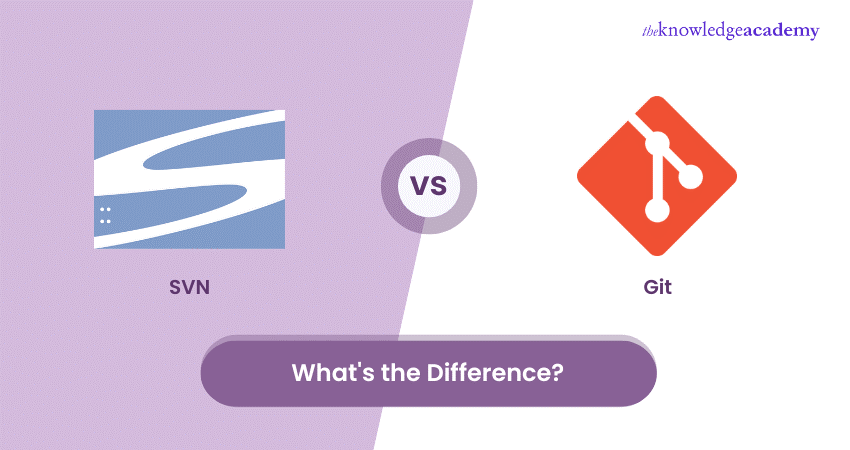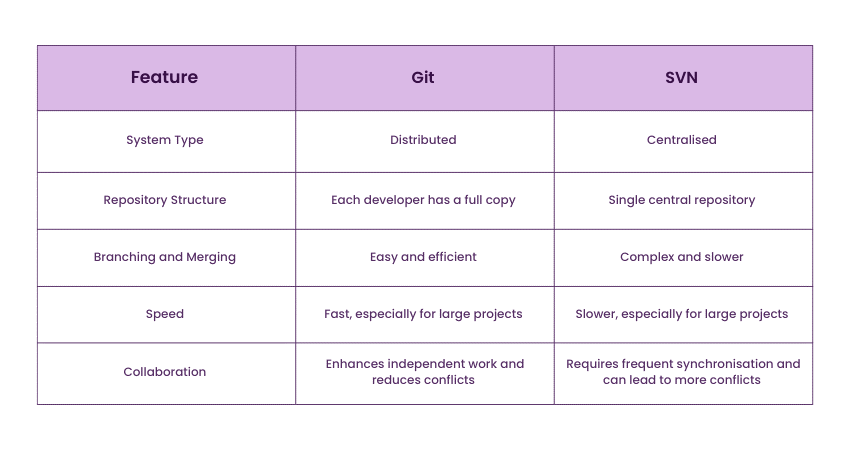We may not have the course you’re looking for. If you enquire or give us a call on +27 800 780004 and speak to our training experts, we may still be able to help with your training requirements.
Training Outcomes Within Your Budget!
We ensure quality, budget-alignment, and timely delivery by our expert instructors.

Ever wondered why developers argue passionately over version control systems? The heart of the debate often comes to a standstill in the SVN vs Git debate. Understanding their differences could be the crucial step to mastering your projects. Let’s dive into the strengths and weaknesses of SVN and Git and discover which one best fits your workflow.
Table of Contents
1) What is SVN?
2) What is Git?
3) Key Differences Between GIT and SVN
4) Which One Should You Choose?
5) Conclusion
What is SVN?
SVN is a centralised version control system developers use to track changes in their code repository. It allows multiple users to collaborate on a project by managing different file versions. Unlike Git, SVN requires a central server where all code revisions are stored, making it easier to control access but less flexible in distributed environments.
Advantages of SVN
SVN offers several advantages, particularly for certain types of projects, as described below:
a) Centralised Control: SVN's centralised model allows administrators tighter control over the repository, ensuring consistent management and oversight.
b) Simplified Permissions: You can easily manage user permissions on a project-wide basis, which is beneficial for organisations with strict access control requirements.
c) Efficient Handling of Large Files: SVN efficiently manages large binary files and often outperforms Git in these scenarios, making it ideal for projects with extensive non-text data.
Disadvantages of SVN
SVN has several disadvantages that can impact development efficiency and flexibility:
a) Centralised System: SVN relies on a single server for all data storage, making the entire system vulnerable if the server fails or experiences downtime.
b) Slower Operations: Its centralised nature can cause slower performance, especially for larger projects, as every operation requires consistent communication with the central server.
c) Limited Offline Work: Developers cannot work completely offline with SVN since they need to connect to the central server to commit changes or access the entire history.
What is Git?
Git is a distributed version control system that allows each developer to have a complete copy of the repository, including its entire history. This decentralised structure enables offline work, faster commits, and seamless branching and merging. Git's design enables better collaboration and efficiency, making it an ideal choice for dynamic and large-scale development projects.
Build interactive web experiences—sign up our JavaScript and jQuery Course today!
Advantages of Git
Git offers several advantages that make it a preferred version control system for developers:
a) Distributed Nature: Git allows each developer to have a complete local repository copy. This independence enables offline work and reduces reliance on a central server.
b) Efficient Branching and Merging: Git’s branching model is lightweight, allowing for quick branch creation and integration. This flexibility allows for enhanced collaboration and experimentation.
c) Speed: Due to its local operations, Git performs tasks such as commits, diffs, and merges faster to enhance development efficiency.
Disadvantages of Git
While Git is widely used, it comes with certain disadvantages. These limitations are described below:
a) Complexity: Git's distributed nature can be confusing for beginners, and its learning curve is steeper than that of centralised systems such as SVN.
b) Storage Overhead: Git stores the entire repository history on each user's machine, which can increase storage requirements, especially for large projects.
c) Merge Conflicts: In complex projects with several contributors, frequent branching and merging can lead to challenging merger conflicts that require careful resolution.
Become a front-end expert—join our comprehensive Front-End Web Development Course now!
Key Differences Between GIT and SVN
The GIT and SVN may seem identical but carry significant distinctions between them. The table below describes the fundamental differences to help you make an informed decision.

Which One Should You Choose?
When choosing between Git and SVN, consider your project needs and team dynamics. Git is ideal for teams that require speed, flexibility, and robust collaboration features. Its distributed nature allows developers to work offline, create seamless branches, and merge efficient changes. However, due to its steeper learning curve, it might be complex for beginners.
In contrast, SVN is better suited for projects that benefit from centralised control and simplified permission management. It's easier to manage large binary files and is comparatively less demanding concerning initial setup. However, SVN can be slower and less flexible, particularly for large, dynamic projects.
Ultimately, Git is suited for most modern development environments, while SVN remains a robust choice for simpler, centralised workflows.
Create innovative mobile apps—learn from the experts with ours Mobile App Development Course!
Conclusion
In conclusion, the choice between Git vs SVN hinges on your project's requirements and team dynamics. Git delivers exceptional speed, flexibility, and collaboration, making it ideal for modern development environments. In contrast, SVN offers centralised control and simplicity, making it suitable for less intricate projects. Select the tool that fits best with your needs and empower your team to work efficiently.
Build robust web applications—register for our Web Development Using Python and Web2py Course today!
Frequently Asked Questions

SVN is not outdated but is infrequently used in modern development compared to Git. While it remains effective for projects requiring centralised control, Git's distributed nature, speed, and flexibility have made it the preferred choice for most developers today.

Git is generally considered better due to its distributed nature, speed, and robust collaboration features. SVN, however, is better for projects needing centralised control and simpler workflows. The choice depends on your project's needs and team dynamics.

The Knowledge Academy takes global learning to new heights, offering over 30,000 online courses across 490+ locations in 220 countries. This expansive reach ensures accessibility and convenience for learners worldwide.
Alongside our diverse Online Course Catalogue, encompassing 19 major categories, we go the extra mile by providing a plethora of free educational Online Resources like News updates, Blogs, videos, webinars, and interview questions. Tailoring learning experiences further, professionals can maximise value with customisable Course Bundles of TKA.

The Knowledge Academy’s Knowledge Pass, a prepaid voucher, adds another layer of flexibility, allowing course bookings over a 12-month period. Join us on a journey where education knows no bounds.

The Knowledge Academy offers various App & Web Development Training, including the Git & GitHub Fundamentals, and the Javascript And JQuery Training. These courses cater to different skill levels, providing comprehensive insights into Python Dictionary.
Our Programming & DevOps Blogs cover a range of topics related to Software Development, System Administration, and Automation, offering valuable resources, best practices, and industry insights. Whether you are a beginner or looking to advance your Technical Skills, The Knowledge Academy's diverse courses and informative blogs have got you covered.
Upcoming Programming & DevOps Resources Batches & Dates
Date
 Git & GitHub Fundamentals
Git & GitHub Fundamentals
Fri 28th Feb 2025
Fri 4th Apr 2025
Fri 27th Jun 2025
Fri 29th Aug 2025
Fri 24th Oct 2025
Fri 5th Dec 2025







 Top Rated Course
Top Rated Course



 If you wish to make any changes to your course, please
If you wish to make any changes to your course, please


